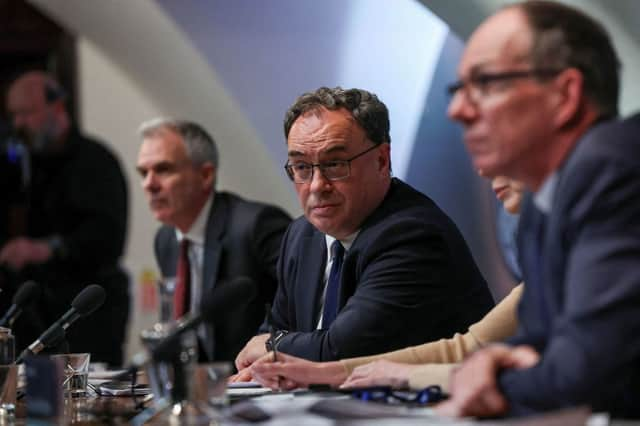Bank of England governor Andrew Bailey and his economists need to treat us like humans in the inflation fight
and live on Freeview channel 276
A joke that’s often made about economists is that they only exist to make weather presenters feel better about themselves.
Personally, I think that’s a little harsh. But it’s hard to ignore the fact that we have just seen a fourth consecutive month of the UK’s foremost economics observers getting it quite badly wrong.
Advertisement
Hide AdAdvertisement
Hide AdInflation rose when it was meant to go down in February. It then failed to reduce by as much as expected in March and April. And now, it has remained at exactly the same rate in May when it was meant to be slightly lower.
If inflation was a human, it would be that colleague who constantly clicks their pen in the office, the person on the bus with an annoying sneeze, or the driver on the motorway who refuses to budge from the middle lane. The difference is that it has a material impact on our daily lives - pushing up everything from the price of the supermarket shop to the cost of going to the cinema.
The Bank of England, whose well-paid, interest rate-setting economists play a key role in public life, has admitted that it has got its forecasting wrong. It has also admitted that some of the language it has used to talk about its fight against inflation has been unhelpful.


In May, its chief economist Huw Pill said that he should have used “less inflammatory” wording after he told a podcast that people in the UK need “to accept they’re worse off”. His boss, Bank of England governor Andrew Bailey, has also taken flack for telling people not to push for pay rises.
Advertisement
Hide AdAdvertisement
Hide AdThe central bank’s chief routinely rails against salary increases because he believes wage growth is the main reason why inflation has become ‘embedded’ in the economy (in the process, he completely ignores other structural issues, like Brexit, and the fact that interest rates aren’t the force they once were in bringing down inflation).
While this may well make the sums work on his spreadsheets, it completely ignores the reality of life for millions of people across the country. While CEOs have been receiving huge pay-packets in recent months as part of AGM season, the majority of public sector workers had seen their salaries fall in real-terms over the past decade, before having their budgets obliterated by the cost of living crisis.
And this is part of a wider problem the Bank economists seem to have. They are trapped in a world of textbooks and established thinking that treats us all like pawns on a chessboard instead of human beings.
How do we snap the institution out of this? I have three main suggestions. One would be for the Bank to move around the country rather than remaining holed up in the City of London. Interest rate setters could spend weeks at a time in places like Blackburn, Swansea, Aberdeen and Omagh to see the impact of their decisions first-hand rather than relying on their ‘agents’.
Advertisement
Hide AdAdvertisement
Hide AdMy second suggestion is appointing members of the public to an advisory panel attached to the Monetary Policy Committee (MPC) - the group that decides interest rates. Not only would this force the Bank’s economists to interact with real people, who have real jobs and real mortgages or rents, but it would also force them to consider their use of language. In turn, this would help people across the country understand exactly why decisions are being made and how it will impact them - a vital public service at a time when the quality of financial education is abysmal.
Third and finally, I think the Bank should chuck out its economics textbooks. The rules of play that have been in place since the 1970s have gone out of the window with this latest crisis. They need to appraise a wider range of viewpoints to try to understand what’s going on in the economy and how to fix it. And they need to do so fast, before inflation checkmates household budgets for a significant chunk of the population.
Comment Guidelines
National World encourages reader discussion on our stories. User feedback, insights and back-and-forth exchanges add a rich layer of context to reporting. Please review our Community Guidelines before commenting.
